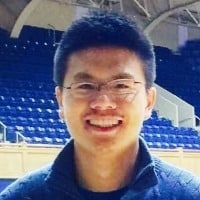Master’s Profile: Li Wang
Li Wang, 2015 BME Master of Science graduate, is a Research and Development Engineer at Amgen in San Francisco, CA

Current Position: Research and Development Engineer at Amgen in San Francisco, CA
Undergraduate Degree: Bachelor of Science in Biomedical Engineering from Fudan University in Shanghai, China, 2013
BME Master’s Program Path: Master of Science in Biomedical Engineering 2013-2015
What work do you do?
I am developing gene regulation tools for Chimeric Antigen Receptor (CAR) T-Cell Therapy at Amgen. These cells are very effective at treating certain forms of cancer that occur in our B-cells, which are cells that defend our body against infection. However, CAR T-cell therapies still have a lot of safety concerns, so there is critical need to develop reversible gene regulation tools. At Amgen, I design and test different vectors as well as gene regulation tools for CAR-T therapy at different levels. I also apply CRISPR screens for primary T-cells to improve specificity of the latest immunotherapy tools.
How did your time at Duke prepare you for your current job?
My department’s responsibility at Amgen is to discover and develop cutting edge biotechnologies to support all the other therapeutic areas, so being able to quickly learn new technologies is required for this challenging job. Luckily, I was exposed to all the exciting new fields in bioengineering during my time as a Duke BME master’s student. I was not only taught basic knowledge, but equipped with the ability to learn new biotechnologies in a quick and efficient way.
What was the most valuable part of your Duke experience?
The culture on campus was very helpful to me. Duke BME has some of the best professors in biomedical engineering, so the work was always engaging and challenging. But we also have one of the best college basketball teams in the country. In the same day we could spend hours doing work in our lab, and then later camp outside Cameron Stadium to get a seat for the big Duke-UNC basketball game. Duke encourages you to find work-life balance, which helped me to adapt the fast pace of life in the professional world without any difficulty.
What were the most useful courses that you took?
BME 574-Modeling and Engineering Gene Circuits was one of the most useful courses I took in Duke. My professor, Lingchong You us all the quantitative methods engineers can use to solve relatively complicated problems in biology. That course gave me a good foundation, and I learned a lot about computational biology. This gave me a better understanding of cell signaling dynamics and cell-to-cell communication patterns – all of which have proven to be quite useful in my current work.
What advice can you give to international students coming to Duke for grad school?
Duke BME is one of the best in the world. So, if you are interested in tissue engineering, biomedical devices or advanced biomaterials, then I encourage you to consider this great master’s program. In addition to the academic benefits, I felt that the Duke community was very friendly toward international students. My academic advisor, Fan Yuan, supported me all through my time at Duke. He paid a lot attention to international student career development, even after graduation. There were also lots of international festivals and events held by Duke students in campus, which made me feel at home. And, if you’re a college basketball fan like me, there is no other choice but Duke. Let’s go Duke!
